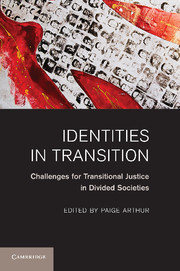Book contents
- Frontmatter
- Contents
- Acknowledgments
- Author Bios
- Introduction: Identities in Transition
- PART I IDENTITY IN TRANSITIONAL JUSTICE MEASURES
- PART II IDENTITIES, TRANSITION, AND TRANSFORMATION
- 7 Canada and the Legacy of the Indian Residential Schools: Transitional Justice for Indigenous People in a Nontransitional Society
- 8 Transitional Justice and the Rights of Minorities and Indigenous Peoples
- 9 “Fear of the Future, Lived through the Past”: Pursuing Transitional Justice in the Wake of Ethnic Conflict
- 10 Transitional Justice, Federalism, and the Accommodation of Minority Nationalism
- 11 History Education Reform, Transitional Justice, and the Transformation of Identities
- Index
- References
10 - Transitional Justice, Federalism, and the Accommodation of Minority Nationalism
Published online by Cambridge University Press: 01 March 2011
- Frontmatter
- Contents
- Acknowledgments
- Author Bios
- Introduction: Identities in Transition
- PART I IDENTITY IN TRANSITIONAL JUSTICE MEASURES
- PART II IDENTITIES, TRANSITION, AND TRANSFORMATION
- 7 Canada and the Legacy of the Indian Residential Schools: Transitional Justice for Indigenous People in a Nontransitional Society
- 8 Transitional Justice and the Rights of Minorities and Indigenous Peoples
- 9 “Fear of the Future, Lived through the Past”: Pursuing Transitional Justice in the Wake of Ethnic Conflict
- 10 Transitional Justice, Federalism, and the Accommodation of Minority Nationalism
- 11 History Education Reform, Transitional Justice, and the Transformation of Identities
- Index
- References
Summary
The dramatic growth of the field of transitional justice (TJ) since the late 1980s is connected to the idea that TJ can serve as an instrument to consolidate democratic transitions. This instrumental justification is not the only rationale for adopting TJ. One can make a plausible normative argument that there are moral duties to expose the truth about gross human rights violations, to prosecute their perpetrators, and to compensate their victims, even if such programs have little or no effect on the larger processes of democratic transition. But the international popularity of TJ is undoubtedly connected to the idea that it also may contribute to democratization, which has increasingly become an accepted goal of international organizations.
There are many ways in which TJ has been said to help consolidate democracy, but one familiar claim is that in societies that have been scarred by ethnic animosity or religious intolerance, TJ can help reshape identities and, in particular, to weaken those aspects of people's identities that were the source of violence and conflict and to replace them with a strengthened sense of shared identity related to common membership in the national political community. For example, the ethnic identities of “Hutu” and “Tutsi” had become interpreted in Rwanda as inherently antagonistic and monolithic, and hence were capable of being mobilized for acts of genocide.
- Type
- Chapter
- Information
- Identities in TransitionChallenges for Transitional Justice in Divided Societies, pp. 303 - 333Publisher: Cambridge University PressPrint publication year: 2010
References
- 2
- Cited by

